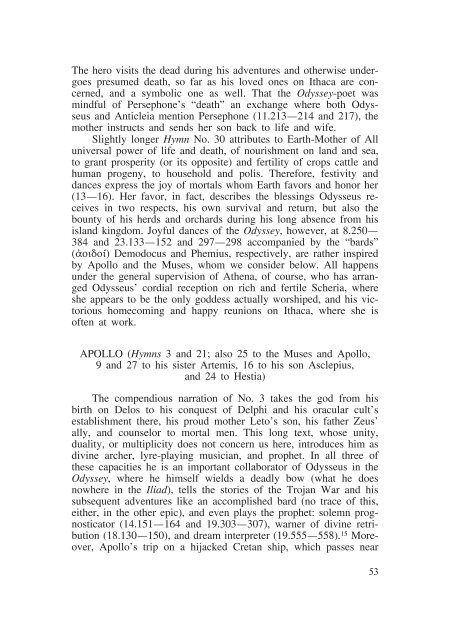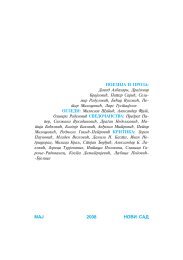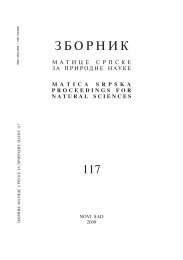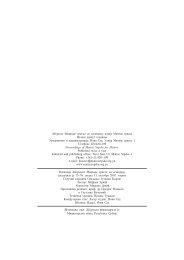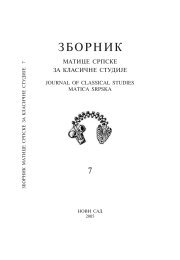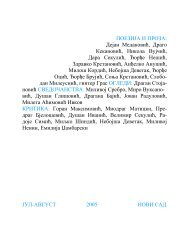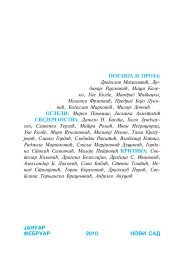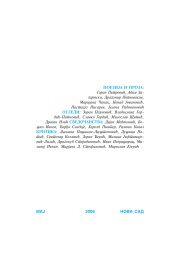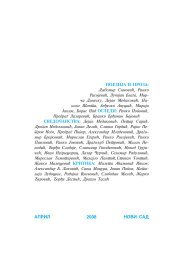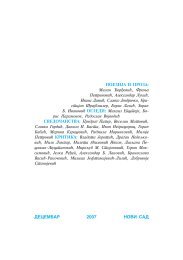You also want an ePaper? Increase the reach of your titles
YUMPU automatically turns print PDFs into web optimized ePapers that Google loves.
The hero visits the dead during his adventures and otherwise undergoes<br />
presumed death, so far as his loved ones on Ithaca are concerned,<br />
and a symbolic one as well. That the Odyssey-poet was<br />
mindful of Persephone's “death" an exchange where both Odysseus<br />
and Anticleia mention Persephone (11.213—214 and 217), the<br />
mother instructs and sends her son back to life and wife.<br />
Slightly longer Hymn No. 30 attributes to Earth-Mother of All<br />
universal power of life and death, of nourishment on land and sea,<br />
to grant prosperity (or its opposite) and fertility of crops cattle and<br />
human progeny, to household and polis. Therefore, festivity and<br />
dances express the joy of mortals whom Earth favors and honor her<br />
(13—16). Her favor, in fact, describes the blessings Odysseus receives<br />
in two respects, his own survival and return, but also the<br />
bounty of his herds and orchards during his long absence from his<br />
island kingdom. Joyful dances of the Odyssey, however, at 8.250—<br />
384 and 23.133—152 and 297—298 accompanied by the “bards"<br />
(Èoidoå) Demodocus and Phemius, respectively, are rather inspired<br />
by Apollo and the Muses, whom we consider below. All happens<br />
under the general supervision of Athena, of course, who has arranged<br />
Odysseus' cordial reception on rich and fertile Scheria, where<br />
she appears to be the only goddess actually worshiped, and his victorious<br />
homecoming and happy reunions on Ithaca, where she is<br />
often at work.<br />
APOLLO (Hymns 3 and 21; also 25 to the Muses and Apollo,<br />
9 and 27 to his sister Artemis, 16 to his son Asclepius,<br />
and 24 to Hestia)<br />
The compendious narration of No. 3 takes the god from his<br />
birth on Delos to his conquest of Delphi and his oracular cult's<br />
establishment there, his proud mother Leto's son, his father Zeus'<br />
ally, and counselor to mortal men. This long text, whose unity,<br />
duality, or multiplicity does not concern us here, introduces him as<br />
divine archer, lyre-playing musician, and prophet. In all three of<br />
these capacities he is an important collaborator of Odysseus in the<br />
Odyssey, where he himself wields a deadly bow (what he does<br />
nowhere in the Iliad), tells the stories of the Trojan War and his<br />
subsequent adventures like an accomplished bard (no trace of this,<br />
either, in the other epic), and even plays the prophet: solemn prognosticator<br />
(14.151—164 and 19.303—307), warner of divine retribution<br />
(18.130—150), and dream interpreter (19.555—558). 15 Moreover,<br />
Apollo's trip on a hijacked Cretan ship, which passes near<br />
53


